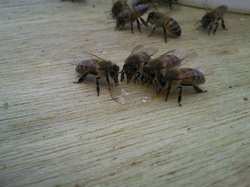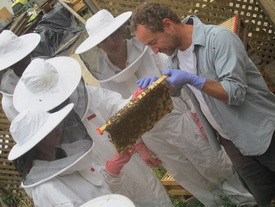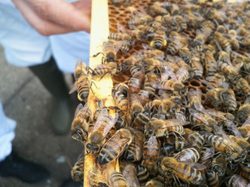Bees in the universe
 Honeybees that live at the Skip Garden
Honeybees that live at the Skip Garden
An Ancient History
Did you know that bees have been around for about 130 million years! They have an intrinsically linked relationship with flowering plants, so much so that we don't know which one came first - bees or flowers? But bees most likely helped flowering plants spread around the globe.
Bees are a lot older than human beings, but we share a significant history. In many ancient cultures, bees and their honey were prized and held in esteem. In fact, honey was used as a sweetener for a long time before sugar was, in cakes and sweetmeats.
Eight thousand years ago, a cave painting was found in Spain, showing early humans hunting for honey. In Greek mythology, bees have been depicted as Goddesses. The Romans offered honey as a gift to their Gods and Ancient Egyptians are believed to be the first to keep bees in hives. Our history with bees is a very long and special one that has survived through the ages.
Did you know that bees have been around for about 130 million years! They have an intrinsically linked relationship with flowering plants, so much so that we don't know which one came first - bees or flowers? But bees most likely helped flowering plants spread around the globe.
Bees are a lot older than human beings, but we share a significant history. In many ancient cultures, bees and their honey were prized and held in esteem. In fact, honey was used as a sweetener for a long time before sugar was, in cakes and sweetmeats.
Eight thousand years ago, a cave painting was found in Spain, showing early humans hunting for honey. In Greek mythology, bees have been depicted as Goddesses. The Romans offered honey as a gift to their Gods and Ancient Egyptians are believed to be the first to keep bees in hives. Our history with bees is a very long and special one that has survived through the ages.
 A beehive frame at the Skip Garden
A beehive frame at the Skip Garden
The Importance of Bees
Bees pollinate an incredible amount of crops that we eat every day. They have furry bodies that pick up the pollen of flowers, enabling them to reproduce. Just some of the plants they pollinate are: courgettes, apples, pears, mangoes, plums, carrots, cauliflowers... and so much more.
These ancient creatures are extremely important to the variety of fruit and vegetables we have. Do bees pollinate your favourite vegetable or fruit plant?
Bees pollinate an incredible amount of crops that we eat every day. They have furry bodies that pick up the pollen of flowers, enabling them to reproduce. Just some of the plants they pollinate are: courgettes, apples, pears, mangoes, plums, carrots, cauliflowers... and so much more.
These ancient creatures are extremely important to the variety of fruit and vegetables we have. Do bees pollinate your favourite vegetable or fruit plant?

The Hive Community
The hive is a fascinating community with a role for every bee. Each hive has a Queen bee, drone bees (males) and worker bees (females). They must all work together in order for the hive to prosper.
The worker bees collect nectar and pollen from flowers in order to turn it into honey in a special second stomach they have solely for that purpose! The honey stored by the bees is essential for them to survive the winter months when there will be no flowers for them to gather food from.
The drones mate with the Queen in order for her to lay eggs into the hexagonal homes where they will be looked after by the worker bees. The Queen lays all the eggs for the hive as she is the only fertile female bee!
The hive is a fascinating community with a role for every bee. Each hive has a Queen bee, drone bees (males) and worker bees (females). They must all work together in order for the hive to prosper.
The worker bees collect nectar and pollen from flowers in order to turn it into honey in a special second stomach they have solely for that purpose! The honey stored by the bees is essential for them to survive the winter months when there will be no flowers for them to gather food from.
The drones mate with the Queen in order for her to lay eggs into the hexagonal homes where they will be looked after by the worker bees. The Queen lays all the eggs for the hive as she is the only fertile female bee!
